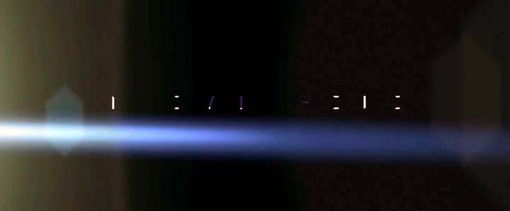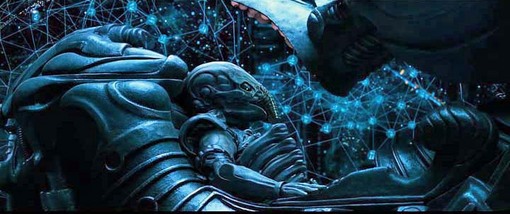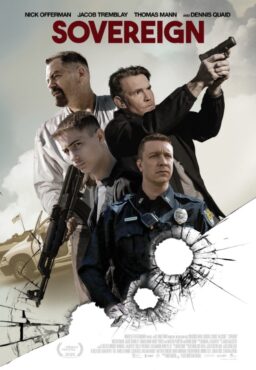The visceral impact that Ridley Scott‘s “Alien” had in 1979 can never quite be recaptured, partly because so many movies have adapted elements of its premise, design and effects over the last three decades — from John Carpenter’s remake of “The Thing” (1982) to David Cronenberg‘s remake of “The Fly” (1986) to “Species” (1998) and “Splice” (2009). No movie had ever looked like this. And it still works tremendously — but let me tell you, in 1979 a major studio science-fiction/horror film that hinted darkly of interspecies rape and impregnation was unspeakably disturbing. (It got under my skin and has stayed there. We have a symbiotic relationship, this burrowing movie parasite and I. We nourish each other. I don’t think Ridley Scott has even come close to birthing as subversive and compelling a creation since.)
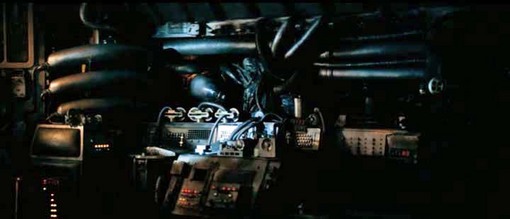
The thing is, the filmmakers actually took out the grisly details involving just what that H.R. Giger “xenomorph” did to and with human bodies (the sequels got more graphic), but in some ways that made the horror all the more unsettling. You knew, but you didn’t know. It wasn’t explicitly articulated. Dallas (Tom Skerrit) just disappears from the movie. The deleted “cocoon” scene (with the haunting moan, “Kill me…”) appeared later on a LaserDisc version of the film, and then was incorporated into the 2003 theatrical re-release for the first time. The deleted footage:



“Alien” was loaded with sexual and reproductive imagery: the pilot alien (which the movie crew nicknamed the “space jockey”) behind the phallic device; the ship shaped to suggest a uterus; the proboscis of the xenomorph’s “facehugger” stage that inserts itself down the throat; the “birth” of the spermatozoa-shaped “chestburster”; the phallus dentate that protrudes from within the xenomorph’s larger set of jaws; the egg chamber (notice how the opening above the ship in the image below from “Prometheus” resembles the opening of the eggs in “Alien”); the Nostromo’s birth-canal-like corridors and dilating cervical hatches; the central computer named “Mother”; the alien appendage that raises up between Lambert’s legs when it’s about to impregnate her…



It was implicitly about rape — and especially male fears of penetration, according to screenwriter Dan O'Bannon, who said many years later: “One thing that people are all disturbed about is sex… I said ‘That’s how I’m going to attack the audience; I’m going to attack them sexually. And I’m not going to go after the women in the audience, I’m going to attack the men. I am going to put in every image I can think of to make the men in the audience cross their legs. Homosexual oral rape, birth. The thing lays its eggs down your throat, the whole number.”

After the internalized rape movie, James Cameron came up with a more extroverted approach to a sequel in “Aliens” (1986) — a rip-roaring action-war-horror movie about motherhood that climaxed with a battle between two Big Mamas defending their children, Ripley vs. the Alien Queen. David Fincher took on “Alien3” (1992) at the last minute, after it has been through a number of writers and directors (William Gibson, Eric Red, Renny Harlin, David Twohy, Vincent Ward). He had to start shooting without a finished script, and the movie was taken away from him in post-production. It wound up focusing on religion and superstition, with a monastery-prison full of monks who saw Ripley as a temptation and the alien as the devil.
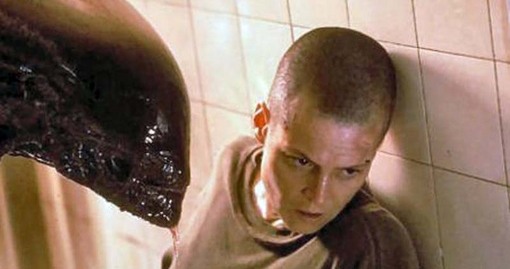
Kathleen Murphy’s Film Comment piece is essential reading:
For maximum impact, “Alien3” requires recent screenings of the first two films in the trilogy. I’d like to say that this is a positive new development in sequelmaking, but it’s really more a matter of a director–27-year-old music video veteran David Fincher–who cagily borrows and echoes potent ingredients from the visions of first-rate filmmakers Scott and Cameron. Though he has almost no feeling for the integrity and logic of space (narrative space, strategic space) or action-in-space,** and not much of a gift for character individuation, Fincher’s by no means a total write-off. “Alien3” often looks and feels like an expression of some of the darker elements of Christian and pagan myth in the Sturm und Drang style of those avant-garde comic-book novels abrim with ambitiously apocalyptic artwork. And some of Fincher’s coopted echoes do resonate interestingly in this popcult version of Dreyer’s “Jeanne d’Arc.”
Finally (because we’re not going to get into “Alien vs. Predator”) there was “Alien Resurrection” (1997), directed by Jean-Pierre Jeunet from a script by (yes) Joss Whedon,* which dealt with rebirth (see title) through genetic manipulation and cloning.
Which brings us (at last!) to “Prometheus,” Ridley Scott’s belated quasi-prequel (made 33 years after “Alien” — is that a hint? — and set mostly in 2093, 29 years before the events of “Alien”), which retraces the structure of Scott’s earlier film almost beat-for-beat. It has some of the same flaws as “Alien3” — skeletal characters; themes and ideas that (in some cases quite deliberately) aren’t quite fleshed out (and that’s what this kind of visceral-image filmmaking is all about; see the collected body-horror works of David Cronenberg).

As screenwriter Damon Lindelof (“Lost“) said in an interview: “Ridley was very interested in talking about, ‘What are the answers to the questions that “Prometheus” is posing that are not necessarily definitively spelled out in the body of “Prometheus”?'” So, they deliberately left some questions unanswered for the sequel, like what made the Big White Humanoids known as “the engineers” (who, it is theorized, created life on Earth) turn against humanity and want to destroy us. (Ridley Scott has suggested that perhaps they hold a 2000-year-old grudge, because we killed Jesus and he was one of Them.)

If there’s one thing we know about Scott it’s that he can always deliver eye-popping images, even when there’s not much else to recommend the movies he makes with them (“1492: Conquest of Paradise”), or when their very prettiness undercuts and trivializes the drama (“Thelma & Louise”). No matter what, everyone seems to agree that these movies look fantastic (and the more vapid and pretentious among us might like to assert that they’re “well-shot).

“Prometheus” has very close structural and thematic relationships to both “Alien” and “2001: A Space Odyssey,” which is something I’ll get into in more detail below. (I think of the Discovery from “2001” as a gigantic sperm cell inseminating “Prometheus.”) Because when a film shows so little regard for the basic craftsmanship of storytelling and character, you have to at least consider the possibility that the filmmakers are telling you that they’d prefer it to be viewed in other terms. (Both Kubrick’s “The Shining” and “Eyes Wide Shut” fall into that category, I think — preposterous and/or unsatisfying on their generic surfaces, perhaps, but working powerfully in other more primal or abstract dimensions.)
“Alien” and “Aliens” were also criticized, in their day, for (among other things) featuring templatized characters, something horror and action pictures often do. They’re like platoon movies, where each member of the squad has a few characteristics that distinguish him/her from the others. “The price paid for the excitement, and it’s a small one, is very little involvement with the characters themselves,” said Variety in 1979, “… a generally good cast in concededly cardboard roles.”


But the actors in “Alien” — Sigourney Weaver, Tom Skerritt, Yaphet Kotto, Harry Dean Stanton, Veronica Cartwright, Ian Holm, John Hurt, Jonesy the cat — brought a freshness and spontaneity to the blue-collar crew (another great idea for characters in this high-tech genre) unlike anything we’d seen in horror/science-fiction before. “Aliens” was performed in a different style (very much like a platoon movie, with Cameron’s trademark tough-talk) but, again, even within the limitations of the genre, the actors had something to work with and they were terrific: Weaver again, Michael Biehn, Bill Paxton, Lance Henricksen, Jenette Goldstein, Paul Reiser, Carrie Henn…

“Prometheus” has a talented cast, too — especially Michael Fassbender, Noomi Rapace, Idris Elba, Charlize Theron, Guy Pearce, Logan Marshall-Green (a dead ringer for a thinner Tom Hardy with the same purdy mouth). And yet, some of the characters aren’t even given a chance to register — especially the two pilots (their one bit of business is they keep making bets with each other) and a disposable geologist and biologist whose only function is to behave absolutely nonsensically at every turn. Most of the underdeveloped Prometheus crew are scientists and corporate drones, and most of their dialog isn’t very fresh or funny, although Idris Elba as Prometheus Captain Janek is a joy. When asked if he can land the ship in a certain spot, he says: “I wouldn’t be very good if I couldn’t.” Spoken like Cary Grant in “Only Angels Have Wings”!

“Alien” was not universally hailed as a classic in 1979. It was panned by Vincent Canby, David Denby, Dave Kehr, John Simon, Frank Rich and other prominent critics. In “Why Are Movies So Bad? Or, The Numbers, Pauline Kael wrote:
It would be very convincing to say that there’s no hope for movies–that audiences have been so corrupted by television and have become so jaded that all they want are noisy thrills and dumb jokes and images that move along in an undemanding way, so they can sit and react at the simplest motor level. And there’s plenty of evidence, such as the success of “Alien.” This was a haunted-house-with-gorilla picture set in outer space. It reached out, grabbed you, and squeezed your stomach; it was more gripping than entertaining, but a lot of people didn’t mind. They thought it was terrific, because at least they’d felt something: they’d been brutalized…. Yet there was also a backlash against “Alien”– many people were angry at how mechanically they’d been worked over.


I mention this only to show that, if a movie is going to stand the test of time… well, only time will tell. Were people wrong to feel they’d been “worked over” (that was the filmmakers’ intention!)? Was David Denby wrong to say “Alien” was “so ‘effective’ it has practically turned me off movies altogether”? No. How could they be? That was the experience they had, and that was the way they saw it. Just because it’s now accepted as a kind of canon classic, I doubt they’d think the movie is any better now than it was then. [SPOILERS from here on out.]
For a really funny viral recap of incoherent plot and character points in “Prometheus” (explanations for some of which have been deliberately withheld for possible sequels), watch this Red Letter Media video:
(The deadpan parody of senselessly sloppy/busy Duplassian visual grammar is as funny as the barrage of plot-hole questions. Here’s one they missed that really bugged me while I was watching the movie: Why did everybody have helmet-mounted cameras that sent video feeds to the Prometheus and then nobody on board bothered to watch them, even though that was their purpose, to document a scientific mission? And they didn’t record them, either? It would have been so easy to see what had happened if they just skipped back to the video of when certain crew members disappeared or were killed. Might have made for some spookily effective footage, too. They have security cameras at the 7-Eleven that do a better job than this. Compared to the holographic 3D imaging devices in “Prometheus,” the little black-and-white Pac Man-like 2D grid tracking technology of “Alien” is crude — but at least the characters, and the movie, actually use it for something.)
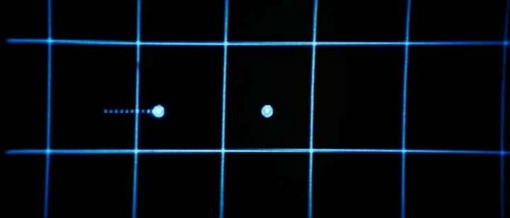

This time, the subject, as you might expect from the nature of the enterprise, is origin myths — not just of the “Alien” universe (though we find out more about the species of oversized humanoids we first saw at the beginning of “Alien”), but of mankind itself. We begin by soaring over a barren planet, all rocks and rivers but without life.

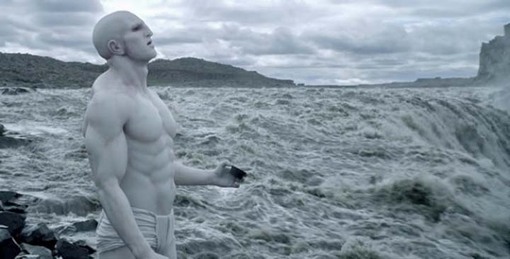
A gigantic ship hovers over a horseshoe-shaped waterfall (the shape echoes the form of another ship earthlings will stumble upon in the future), while a large, powdery-white humanoid stands on the precipice and, ritualistically, drinks from an ornate vessel. He begins to dissolve from the inside, and tumbles into the river below, where his DNA swirls in the currents, giving birth to what will, eventually, become human life on Earth. That’s my interpretation of what’s happening, at least. I’ve heard others, including the suggestion that this planet could be anywhere. What I like most about it is the way it’s visualized. And that’s pretty much the way I feel about the whole film. And if the movie never quite shows us anything as eye-popping after this opening (well, there is that surgery scene…), that’s understandable because everything else is revisiting the universe of the “Alien” movies.

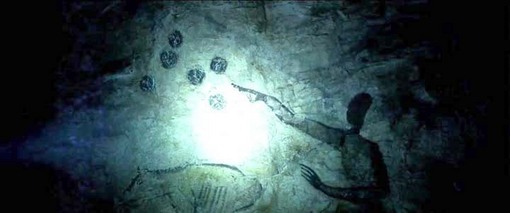
Eons pass. In what we call 2089, archaeologists discover a number of cave paintings in distant locations around the globe that show tall humanoids pointing to a cluster of objects in the sky. It’s not a map, one of them postulates. It’s an invitation. A few years later, in 2093, a ship, the Prometheus, is sent deep into space to find out who visited Earth all those years ago, and what they wanted. The archaeologists refer to them (the large white humanoids) as “the engineers” because it is theorized that they engineered humanity. Are they the gods who created us?

And is any of this sounding familiar? Because it’s meant to. It’s the outline for Stanley Kubrick’s “2001: A Space Odyssey” (1968), inspired by Arthur C. Clarke’s 1948 short story, “The Sentinel,” in which humans discovered a beacon on the moon that had been left by voyagers from another planet long before homo sapiens had evolved. “Prometheus” quite consciously piggy-backs on images and motifs from “2001” (some of which accompany the article you’re now reading).

I remember going to see “Stargate” (the movie) with some friends when it first came out. I thought the story and characters were forgettable (in fact, I’ve long ago forgotten them), and the only image I remember was a pyramid — but that was also on the poster and in the ad campaign, so I’m not sure if I actually remember it from the movie. But one of my friends loved it. When I asked him what he loved, he simply said, “Visual splendor!” I mention this only to say that I’m not one who celebrates pretty images in movies just because they’re pretty. And we all know that, if there’s one thing Ridley Scott has consistently delivered from “The Duellists” (1977) onward, it’s lovely images — even when, arguably, the movies themselves were D.O.A. (“1492: Conquest of Paradise”) or when the prettiness sugarcoated the messier and more compelling aspects of raw humanity (“Thelma & Louise”). As you would expect, there’s a lot of hideous beauty here — dark, organic, ominous, but undeniably gorgeous in the biomechanical H.R. Giger style familiar from “Alien,” its sequels and its imitators. (Giger’s style of visionary body-horror entered popular culture through “Alien” and covers for LPs such as Emerson, Lake & Palmer’s 1973 “Brain Salad Surgery” and Deborah Harry’s 1981 “Koo-Koo.”)
And that fusion of flesh and technology is one of the major themes of “Prometheus” — right from the opening. Once aboard the Prometheus in 2093, the first character we see is David (Michael Fassbender), who we soon find out is an android designed to exhibit signs of emotion so as to better facilitate interactions with humans. Artificial intelligence with artificial emotion — that’s something we immediately associate with “Prometheus” forbears such as HAL 900 in “2001,” Ash (Ian Holm) in “Alien,” Bishop (Lance Henricksen) in “Aliens,” the Replicants in Scott’s “Blade Runner,” and, yes, David (Haley Joel Osment) in the Spielberg/Kubrick “A.I. Artificial Intelligence.” We first hear him talking to another voice that sounds remarkably like HAL.
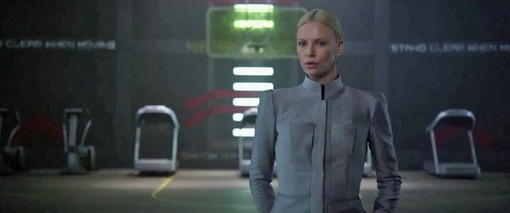

We’re asked to entertain the notion that the cold corporate commander of the mission, Meredith Vickers (Charlize Theron) might be an android like David. She sure looks and behaves like one. And she could very well be. The joke is that Janek dares her to have sex with him to prove that she’s not. But for all we know she could be engineered for sex, too — a “basic pleasure model” with extras, as in “Blade Runner.” And we never see the sex scene between them (if it happens), anyway. A point is also made that the financier of the mission, Peter Weyland (Guy Pearce, in possibly the worst old-age makeup I have ever seen) is her “father,” but that could mean anything from biological parent to research and manufacturing backer.
Let me stop here (it’s the “live vs. dislike” paragraph!) to say that I understand why “Prometheus” has provoked such a range of reactions. I can certainly understand why some people are bowled over by its “visual splendor,” because so was I. And Fassbender, Elba and Rapace are fun to watch, even in limited roles.

I can also see why those who went in with high expectations (I didn’t) based on Scott’s return to science-fiction/horror for the first time since “Alien” and “Blade Runner” were disappointed, because although it expands the “‘Alien’ universe” (you could say Joss Whedon’s “Serenity“ did that, too, just by using the Weyland-Yutani logo), it doesn’t add much to that world.
Not unlike “Star Trek V: The Final Frontier,” “Prometheus” uses god as a MacGuffin — as Josh Larson writes at thinkchristian.net: “‘Prometheus’ purports to be about big ideas, but if you’re really curious about something, you do more than mention it.” ) People immediately started arguing about whether it was founded in secularism, panspermia, or Intelligent Design (or, in “Lost” fashion, punting for future revelations). Perhaps it’s merely what Zach Campbell calls “diffuse cinema,” a self-conscious hodgepodge of ideas open to various interpretations but with no particular design in mind. (Sometimes it pays to be vague, especially if you don’t really have anything to say.)
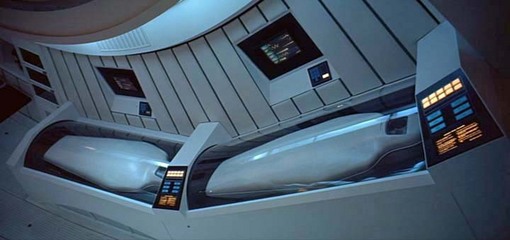
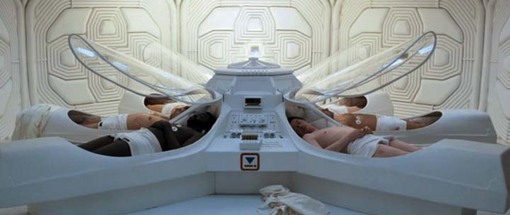

Now let’s look at two of the movies that are living inside “Prometheus.” First, of course, there’s “Alien.” Many of the same (or similar) scenes, characters and images from the earlier picture are embedded in the new one’s DNA. After two brief prologues (the “engineer” dissolving into the water, the discovery of a cave painting in Scotland) the crew of the ship (Nostromo in “Alien” and Prometheus in “Prometheus”) are shown coming to life after months/years in stasis.


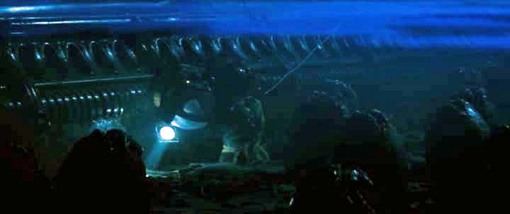

The ship lands on a planet(oid), following a signal of unknown origin (a transmission in “Alien”; the cave paintings in “Prometheus”). The mission turns out to be something other than what it originally appeared to be. The crew of the Prometheus discovers a vessel and a race of large, dead humanoids who are familiar (the so-called “space jockey”) from “Alien.” (Turns out what we thought were their biomechanics heads are really helmets.) They find a large chamber where “eggs” (more like canisters in “Prometheus”) contain some form of life. (That these seem to be intended for shipment to Earth reminded me somewhat of the Scientology doctrine of Xenu.)

When one of the crew is infected, the commander of the ship (Ripley in “Alien,” Vickers in “Prometheus”) tries to prevent the contaminated man from re-boarding for fear of breaking quarantine. The android overrules her and lets them in.
The xenomorph implanted in the body of one of the crew gets loose on the ship.




While there is no “facehugger” in “Prometheus,” the alien larvae look like vaginal-headed cobras and can dissolve/penetrate helmets, and they have highly acidic blood.


Eventually, like Ripley (and Kane), Shaw strips to her underwear, emphasizing her vulnerability in this biomechanical setting.
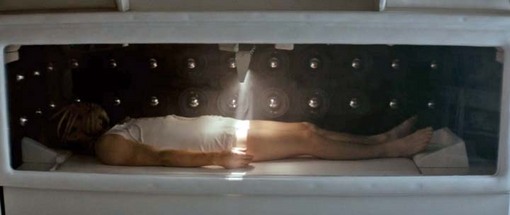


The android is decapitated, but continues to speak.
In an attempt to kill the xenomorph and prevent it from getting back to earth, the ship is destroyed and Shaw/Ripley escapes in a pod. Only it turns out the xenomorph is aboard.
The movie ends with the voiceover log (not unlike the ending of a “Star Trek” episode) of the surviving crew member, who heads off into space.
On the one hand, this is precisely what a “sequel/prequel” is designed to do: to return you to a world you want to revisit. (See “Back to the Future 2,” a movie that outdoes the original, in my estimation, by actually taking you inside the first movie and showing it to you from a slightly different point of view — like a variation on “Rosencrantz & Guildenstern are Dead.” Genius). How well it works for you will depend on whether you feel the film is attacking its story with conviction or if it’s just ticking off a list of scenes and images from its superior predecessor.
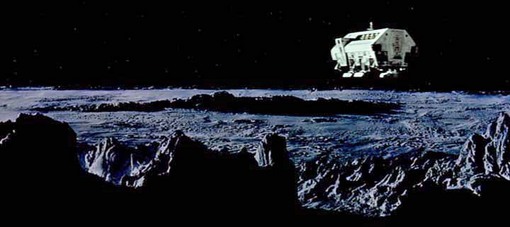

The other “ghost movie” that haunts “Prometheus” (quite consciously on the part of the filmmakers) is, as I said before, “2001: A Space Odyssey.”

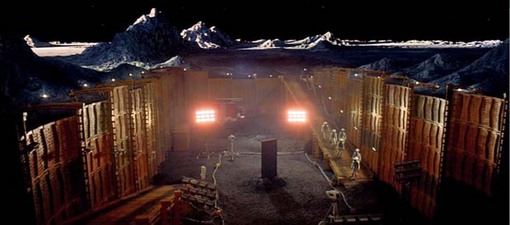

Long before the birth of humanity, a sentinel is placed on Earth (and, apparently, the moon) by an advanced alien intelligence. It appears to have accelerated the evolution of mankind. (In “Prometheus,” it’s the actual introduction of “engineer” DNA; in “2001” it’s more of a catalyst, giving primates the inspiration for using tools/weapons.)


Eons later, the sentinel is unearthed (on Earth in “Prometheus”; on the moon in “2001”). A team of explorers, some in cryonic hibernation, is sent into deep space to investigate.


An artificially created agent aboard the ship — HAL, David (insert Burt Bacharach joke here) — has been designed with an emotional component to make it easier for humans to interface with. This manufactured intelligence knows the real nature of the mission and is willing to sacrifice the crew to achieve it.


And there are many other little moments and images: a forced entry into the ship through an airlock; some red, mid-century modern furniture design; a birth scene; the mysterious appearance of an old man (though the make-up in “2001” is far better)…

In 2012, “2001: A Space Odyssey” is 44 years old. I won’t be around to see it, but I wonder how “Prometheus” will play in 2056…


UPDATE: (06/15/12): Just caught up with Glenn Kenny’s account of His First Time with “Alien” as a 19-year-old, which is well worth reading. His experience was so very different from mine (I was 21 in the summer of ’79!):
I’m not entirely certain whether or not I was under the influence of cannabis during the viewing (it’s not unlikely, frankly) but I can tell you I was feeling pretty feisty. When the spawn of the face-sucker burst out of John Hurt’s chest, unhinged its jaw, screeched, and scurried away, I actually tittered, and then sputtered, rather loudly, and with no small amount of what I then considered punk-rock indignation, “It’s the ‘Eraserhead’ baby with teeth!” Yes, I was pretty much the guy that you and everybody else in the sentient movie-viewing universe wants to pummel. And when the picture was over, I shrugged and seethed “That’s IT?” My Close Personal Friend Ron Goldberg™ semi-fumed “It’s just a slicker remake of ‘X! The Terror From Beyond Space.’ ” And then we all went to the Forum diner and then maybe back to Ron’s parents’ place in Clifton to listen to King Crimson’s “Red” and watch the pretty blue volume-level lights on his amplifier, or something.
I had to speed through “Alien” just last night to get the frame grabs for the above post and, even seeing it in fragments on my laptop, I got very tense. Much of that has to do with Scott’s anxiety-producing camera movements (during which you feel how much space is still outside the frame — maybe there’s something out there, like even an alien hiding in the duct work!), and a great deal of it has to do with the score, which echoes Holst’s “The Planets” (those little reverberant flutes still get me) and you don’t know the movie’s really over until the final notes streeeeetch… and resolve. (Remember this was only three years after “Carrie,” when almost every horror movie had a “trick” surprise ending.)
I just want to add that my first experience with “Alien” was probably ideal. It was a Seattle International Film Festival press screening, in 70mm, at the huge, domed UA Cinema downtown — the same theater where “Star Wars” had played (and where “E.T.” would a few years later). So, hundreds of seats… and about a dozen of us sitting in them, spread throughout the auditorium. I spent much of the movie in an upright fetal position. “Them!” had terrified me as a kid, and this movie about being ripped open (and worse) by a large extraterrestrial “insect” made my stomach turn. Later, after it opened, I went to see it with a full house. When the developing xenomorph sluffed off its “facehugger” sac and legs and the Nostromites poked it with instruments somebody in the audience called out “Ooooo, oysters!” Which, most likely, is exactly what the effects folks used — or, at least, were inspired by. Everybody laughed. Nervous laughter, sure, but it did break the tension. I was glad I’d seen it the first time without such a break.


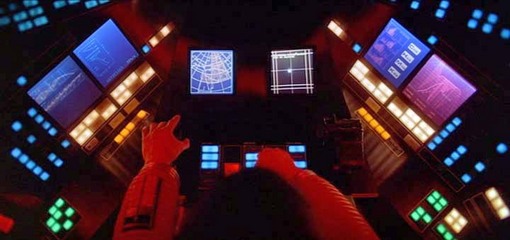
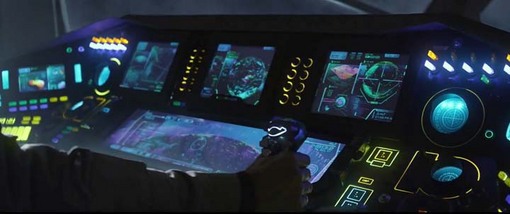
– – – –
* In 2005 Whedon said one of the most accurate and insightful things I’ve ever heard from a writer about how films (like “Alien Resurrection”) can go wrong:
Uh…you know, it wasn’t a question of doing everything differently, although they changed the ending, it was mostly a matter of doing everything wrong. They said the lines… mostly… but they said them all wrong. And they cast it wrong. And they designed it wrong. And they scored it wrong. They did everything wrong that they could possibly do. There’s actually a fascinating lesson in filmmaking, because everything that they did reflects back to the script or looks like something from the script, and people assume that, if I hated it, then they’d changed the script… but it wasn’t so much that they’d changed the script; it’s that they just executed it in such a ghastly fashion as to render it almost unwatchable.
** This written before it was known that the film had been taken away from Fincher and re-cut by the studio.

